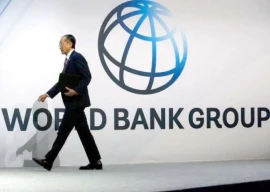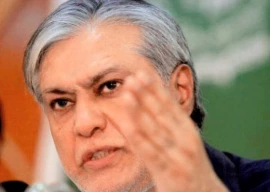
International Financial Institutions (IFIs) never shy away from dictating terms that enable them to skilfully debt trap vulnerable economies – all under the guise of reforms and financial assistance.
IFIs use local and international consultants to lure countries into following IFI prescriptions to achieve ‘sustainable development’. Once a country is trapped in its fold, however, these IFIs unleash monstrous terms and conditions to exploit the country.
This is the same strategy these IFIs have applied on Pakistan and, like many other developing countries, Pakistan too has started to pay the price in the form of high inflation, a freefall of the rupee, a shrinking production sector and the removal of social welfare spending – all under the dictation of IFIs.
It all started with a $27.2 million loan given by the World Bank in 1952. The World Bank was followed by the International Monetary Fund (IMF) in 1958 and the Asian Development Bank (ADB) in 1966. Since then, Pakistan has become a permanent client of the IMF, World Bank and ADB. From Ayub Khan to Prime Minister Shehbaz Sharif, IFIs have remained a constant factor in the national economy.
Bilateral loans and borrowing are another story altogether.
Pakistan has witnessed a sharp increase in bilateral borrowing and commercial loans from banks in the recent past, resulting in high external loans worth $130 billion along with deteriorating economic and social health.
After firmly placing the debt trap, these IFIs are now working to weave a policy trap. Although, the process started many years ago – through the Structural Adjustment Programme – it has been accelerated in the last few years.
From 2017 onwards, negotiations have clearly indicated that these IFIs have more say in Pakistan’s policies than we let on, and this situation urges us to think – are IFI-led programmes or reforms actually beneficial for Pakistan?
The answer is a resounding no – and this can be substantiated through our history with IFIs. It is known fact that many countries crumbled during the IMF’s reform period. Look at what happened to Argentina, Brazil or Mexico. Argentina was compelled to devalue and privatise its national assets. Despite the privatisation measures, the country ended up with mounting debt.
The same is true for Brazil and Mexico. Brazil also kept on paying back debt, but could not get rid of its debt trap – instead the debt increased many folds; and this happened despite Brazil implementing all the IFI-led reforms, privatisations and increasing interest rates (may be one of the highest at that time). Hungary and Greece are the most recent examples of IMF-led disastrous reforms.
There are six lessons for Pakistan to be learnt from the episode of Latin America, Hungary, Greece, Asian and African countries.
Firstly, loans are not a shortcut to achieving any form of development; in fact, commercial loans are one of the easiest ways to stay debt-trapped.
Second, there is no substitute to building on productive sectors. Countries can only grow by focusing on industrialisation, agriculture development and keeping pace with the changing dynamics of markets. For example, Turkey also implemented the IMF, but it kept close focus on its productive sectors. If there is no focus on productive sectors, then austerity measures cannot help the country develop.
Third, IFIs’ formula of overnight reforms is a faulty recipe; there is no magic wand that will change the country’s scenario. Reforms are a hectic and long-term process, and will only yield results when they are designed according to the individual needs, circumstances and status of the country.
China is a noticeable example on this front. China started its reforms in 1978 and sequenced the reforms according to the development status of the country. Once considered a closed economy, China is now a champion of globalisation.
Fourth, IMF-led reforms have no mercy for the poor; it will always protect the exploitive financial sector. Their reforms promote the private sector at the cost of state-owned enterprises.
Fifth, the IMF’s reform agenda under the Structural Adjustment Programme is being derived from Washington Consensus, which called for radical changes. It blurs the lines between revolution and reforms. On the contrary, the theory of reform tells us that it is a time-consuming process and is closer to evolution than revolution.
Moreover, we need to understand that a reform does not just consist of writing a few new policies, principles and placing deadlines. It is more about behavioural changes and building characters of the actors involved. Humans are not machines and characters can take year, if not decades, to be built. A diversion from the principles of reform can lead to chaos.
Sixth, a debt trap is only the beginning of a policy trap. Once a country has been captured in a debt trap, it will ultimately fall in to the policy trap. Thus, the recipe presented or implemented by IFIs, especially the IMF, does not always qualify under the principles of reform.
In this backdrop, Pakistan cannot dream about economic revival and development until we break through the shackles of IFIs. For that purpose, we have to revert back to a production policy and enhance the role of state-owned enterprises.
Luckily, Pakistan has a window of opportunity in the form of the China-Pakistan Economic Corridor (CPEC) and China. CPEC provides us an excellent chance to revive our economy. Special Economic Zones (SEZs) are an opening for the dream of industrialisation to truly materialise. Cooperation in technology and modern IoT will serve as future opportunity.
To benefit from CPEC, however, Pakistan needs to understand that it is an economic opportunity, not charity. Therefore, we will have to deal with it as an economic opportunity and take responsibility of every project. If we miss reaping benefits from CPEC, the policy trap will compel us to compromise on vital national interests.
Lastly, “we must learn the art to shut our mouths and move our hands”. It is the only recipe that can help us revive our economy, achieve sustainable development and break out of the shackles imposed by IFI traps.
The writer is a political economist and a visiting research fellow at Hebei University, China
Published in The Express Tribune, March 6th, 2023.
Like Business on Facebook, follow @TribuneBiz on Twitter to stay informed and join in the conversation.


1731916090-0/sabrina-(3)1731916090-0-165x106.webp)


1732020599-0/BeFunky-collage-(73)1732020599-0-165x106.webp)















COMMENTS (2)
Comments are moderated and generally will be posted if they are on-topic and not abusive.
For more information, please see our Comments FAQ